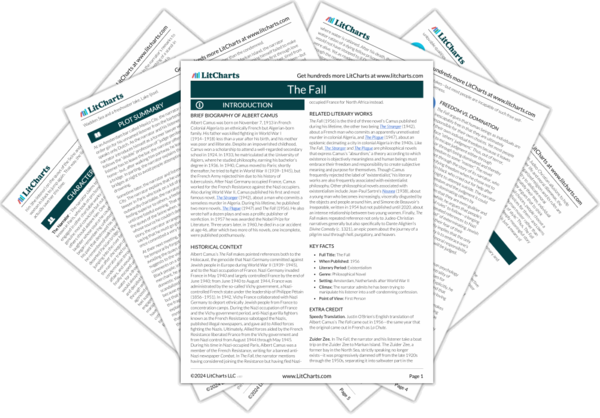The Fall argues that human beings as individuals are inescapably free in that they are ultimately responsible for their own choices. Yet most people are terrified of their own individual freedom because it leaves them “alone” to face “others’ judgment.” Thus, out of terror, most people seek to escape judgment either through dominating others or through being dominated and thereby surrendering their freedom to some “master.” The novel forwards this argument through the story of its narrator, who discovered his own terrifying freedom when he chose not to save a drowning woman in black who cried out for help after she jumped into a river at night to attempt suicide. The narrator is so horrified by his own freedom and the judgment it could bring that he devotes his life to dominating others by manipulatively convincing them that they are even guiltier and morally worse than he is. Meanwhile, he argues that people’s longing for group-based “dreadful rules” to follow—a longing subtly illustrated by the novel’s repeated references to Nazi Germany and its rule-bound “method” of exterminating Jewish people—fundamentally derives from their fear of their individual freedom. Thus, The Fall subtly implies that the only true escape from domination and slavery is to embrace one’s freedom and, in consequence, one’s total moral responsibility and the accompanying likelihood that one will be judged.
Freedom vs. Domination ThemeTracker

Freedom vs. Domination Quotes in The Fall
Anyone who has considerably meditated on man, by profession or vocation, is led to feel nostalgia for the primates. They at least don’t have any ulterior motives.
Of course, I didn’t tell you my real name.
The feeling of the law, the satisfaction of being right, the joy of self-esteem, cher monsieur, are powerful incentives for keeping us upright or keeping us moving forward.
Even in the details of daily life, I needed to feel above. I preferred the bus to the subway, open carriages to taxis, terraces to closed-in places.
Power, on the other hand, settles everything. It took time, but we finally realized that. For instance, you must have noticed that our old Europe at last philosophizes in the right way. We no longer say as in simple times: “This is the way I think. What are your objections?” For the dialogue we have substituted the communiqué: “This is the truth,” we say. “You can discuss it as much as you want; we aren’t interested. But in a few years there’ll be the police who will show you we are right.”
You, for instance, mon cher compatriote, stop and think of what your sign would be. You are silent? Well, you’ll tell me later on. I know mine in any case: a double face, a charming Janus, and above it the motto of the house: “Don’t rely on it.”
I have no more friends; I have nothing but accomplices. To make up for this, their number has increased; they are the whole human race. And within the human race, you first of all. Whoever is at hand is always the first.
As I told you, it’s a matter of dodging judgment. Since it is hard to dodge it, tricky to get one’s nature simultaneously admired and excused, they all strive to be rich. Why? Did you ever ask yourself? For power, of course. But especially because wealth shields from immediate judgment, takes you out of the subway crowd to enclose you in a chromium-plated automobile, isolates you in huge protected lawns, Pullmans, first-class cabins.
Then I realized, as a result of delving in my memory, that modesty helped me to sin, humility to conquer, and virtue to oppress.
They have hoisted him onto a judge’s bench, in the secret of their hearts, and they smite, they judge above all, they judge in his name. He spoke softly to the adulteress: “Neither do I condemn thee!” but that doesn’t matter; they condemn without absolving anyone.
Alone in a forbidding room, alone in the prisoner’s box before the judges, and alone to decide in the face of oneself or in the face of others’ judgment. At the end of all freedom is a court sentence; that’s why freedom is too heavy to bear, especially when you’re down with a fever, or are distressed, or love nobody.











